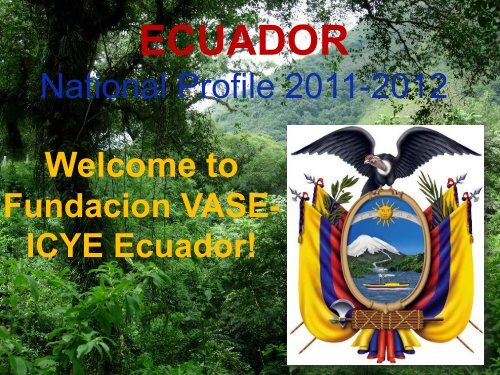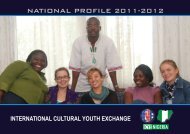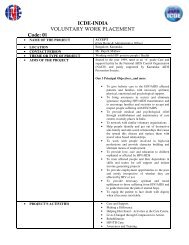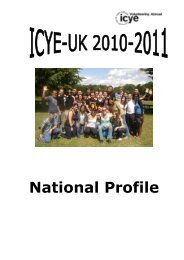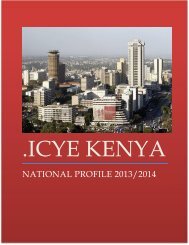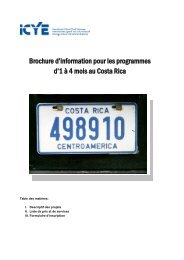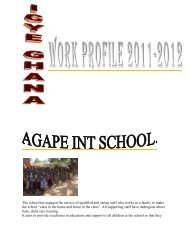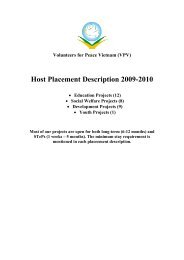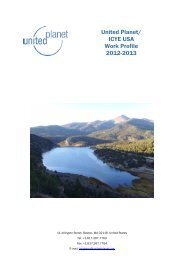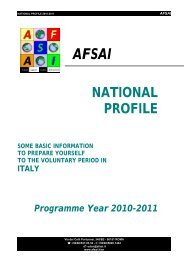ecuador - ICYE
ecuador - ICYE
ecuador - ICYE
Create successful ePaper yourself
Turn your PDF publications into a flip-book with our unique Google optimized e-Paper software.
ECUADOR<br />
National Profile 2011-2012<br />
Welcome to<br />
Fundacion VASE-<br />
<strong>ICYE</strong> Ecuador!
CONTENTS<br />
3. Fundacion VASE – <strong>ICYE</strong> Ecuador<br />
4. VASE´s mission<br />
5. Ecuador´s location<br />
6. Ecuador´s regions<br />
7. Climate<br />
8. Culture & Society<br />
10. Reality<br />
11. Religion<br />
12. Public holidays<br />
13. Economy<br />
14. Government<br />
16. Common phrases & sayings<br />
17. Let’s Eat<br />
18. The fruit bowl<br />
19. Daily Meals<br />
20. Volunteer profile<br />
21. Special programs<br />
22. Accommodation<br />
23. Money<br />
24. Volunteer Work Projects<br />
25. Excursions<br />
26. Cultural Activities<br />
27. Transportation<br />
28. Visa Information<br />
29. Health and Insurance<br />
30. Rules and Regulations<br />
32. Packing List<br />
33. Arrival in Quito<br />
34. Resources<br />
35. Contact Information
Fundacion VASE – <strong>ICYE</strong> Ecuador<br />
Fundacion Voluntariado para la Ayuda Social del Ecuador (VASE) is a<br />
non-profit, non-governmental, non-religious organization dedicated to<br />
facilitate intercultural education and volunteer community service. VASE<br />
is an Ecuadorian organization, officially recognized by the Ecuadorian<br />
Ministry of Economic and Social Inclusion, resolution #0872 in July 2008.<br />
VASE’s office is located in the heart of Quito,<br />
the capital of Ecuador. UNESCO declared the<br />
historic center as the first site in the world of<br />
“Cultural Heritage of Mankind” for its rich<br />
architectural beauty, which can be seen in its<br />
churches, convents, parks, and streets.
VASE’S MISSION<br />
JUMP INTO A NEW EXPERIENCE!<br />
1. Provide volunteer service support for the elderly, children, women, indigenous<br />
groups, human rights organizations, hospitals, schools, and community centers.<br />
2. Implement intercultural education and inspire global citizenship through<br />
international cultural exchange programs.<br />
3. Proclaim peace, solidarity, friendship, tolerance and mutual understanding as<br />
basic values for mankind.<br />
4. Promote understanding and appreciation of cultural diversity.<br />
5. Create sustainable community projects in order to promote social and economic<br />
development of the disadvantaged communities in Ecuador.
ECUADOR’S LOCATION<br />
Straddling the equator in<br />
western South America,<br />
Ecuador has land in both the<br />
Northern and the Southern<br />
hemispheres. It borders<br />
Colombia in the north and Peru<br />
in the South and the East. The<br />
Pacific Ocean is Ecuador’s<br />
western border.<br />
The land area totals 283.560 km², including the<br />
Galapagos Islands. The border with Colombia<br />
is 590 kms. and the border with Peru is 1.420<br />
kms. It has coastline of 2.237 kms.<br />
At Mitad del Mundo – Center of the world, where<br />
the equator crosses Ecuador at latitude 0°0°0°
ECUADOR’S REGIONS<br />
Ecuador is divided into four natural regions:<br />
The Coast<br />
(6 provinces)<br />
The Sierra<br />
(11 provinces)<br />
The Amazon<br />
(6 provinces)<br />
Galapagos<br />
(1 province)
CLIMATE<br />
.<br />
Ecuador has very different<br />
climates and microclimates. All<br />
regions experience wet and dry<br />
seasons.<br />
Coast and Amazon: tropical<br />
weather (23-36 degrees).<br />
Sierra: Cool and “spring-like”<br />
(10 to 18 degrees)<br />
Galapagos: (22 to 32 degrees).
Ecuador is a<br />
multiethnic<br />
and<br />
multicultural<br />
country with a<br />
population of<br />
about 13.8<br />
million people.<br />
CULTURE AND SOCIETY<br />
Ecuador's mainstream<br />
culture is defined by<br />
Ecuador's “mestizo”<br />
majority, which is a<br />
mixture of European and<br />
Amerindian influences<br />
infused with African<br />
elements inherited from<br />
slave ancestors.<br />
Although Ecuador’s<br />
official language is<br />
Spanish, 11 other<br />
indigenous languages<br />
are spoken. The<br />
principle indigenous<br />
language of the<br />
highlands is Quichua.
CULTURE AND SOCIETY<br />
Family<br />
Ecuadorians are known as family- people : the<br />
family life plays an important role and children<br />
normally live with their parents until they are married.<br />
Families most often spend the weekends together.<br />
Gender<br />
Gender roles are different than<br />
in Europe, placing an<br />
emphasis on the woman´s role<br />
in the household, which some<br />
people identify as a<br />
“machismo” mentality.<br />
Children<br />
Primary education is obligatory in Ecuador, however<br />
only about 50% of the population goes on to study<br />
in high school. Also, many children work on the<br />
street as vendors, shoe shiners, or performers.
REALITY<br />
Political instability in the past, the<br />
continuous economic crises, as well as<br />
the weather catastrophe “El Niño”<br />
forced about 3 million Ecuadorians to<br />
migrate to other countries such as<br />
Spain, USA, and Italy. On the other hand,<br />
instability in neighboring countries of<br />
Colombia and Peru (and political<br />
agreements with countries, such as<br />
Cuba) has caused much immigration<br />
into Ecuador.<br />
Foreigners are generally welcomed and<br />
respected by the population. Ecuadorians<br />
are curious to get to know the “gringos”<br />
(general name for foreigners).
RELIGION<br />
• Religion in Ecuador is an expression of the different cultural<br />
heritages in the Ecuadorian culture including the Spanish<br />
colonization, the Native Amerindian and the Afro-Ecuadorian.<br />
• Since Spanish colonization, Ecuador became a Roman Catholic<br />
country. The Catholic Church still has an important place in<br />
Ecuadorian society.<br />
Religion in Ecuador (2008):<br />
87.5% Catholics<br />
10.8% Other Christian<br />
1,5% Atheists and Agnostics<br />
0,2% Traditional Religions<br />
La Basilica del Voto Nacional
PUBLIC HOLIDAYS 2012<br />
• 01.01 New Year<br />
• 20.02 – 21.02 Carnival<br />
• 06.04 Good Friday<br />
• 01.05 Labor Day<br />
• 24.05 Battle of Pichincha<br />
• 10.08 First Shout of Independence<br />
• 09.10 Independence of Guayaquil<br />
• 02.11 Day of the Dead<br />
• 03.11 Independence of Cuenca, Azuay<br />
• 25.12 Christmas
ECONOMY<br />
Ecuador has varied natural ecosystems that allow<br />
the growth of many plants, fruits, vegetables and<br />
crops. The main products are oil, bananas, flowers<br />
and shrimp.<br />
Deteriorating economic performance in 1997-98 culminated in a severe<br />
economic and financial crisis in 1999. The crisis was precipitated by a<br />
number of external shocks, including the El Niño weather phenomenon in<br />
1997, a sharp drop in global oil prices in 1997-98, and international<br />
emerging market instability in 1997-98.<br />
In 2000 the government announced the adoption of<br />
United States dollar as the national currency. While<br />
debatable, it has helped the country gain economic<br />
stability as well as a better image for foreign investors.<br />
Nevertheless, Ecuador now depends on the monetary<br />
policy of the USA due to its currency.<br />
In 2001 70% of the population lived below the poverty<br />
line; however, the situation is improving. According to<br />
the National Institute of Statistics and Censuses (INEC),<br />
approximately 425 thousand people left poverty and<br />
another 197 thousand left extreme poverty between<br />
December 2006 and June 2010.
GOVERNMENT<br />
President Rafael Correa<br />
Ecuador has been a democracy since 1979. The political<br />
situation in the late 1990s and early 2000s was very<br />
unstable, a condition which sparked three presidents’<br />
ousting. However, there has been an increase in stability in<br />
the past 5 years, since the election of Rafael Correa, who<br />
was officially declared president of Ecuador on December 4,<br />
2006 and sworn in on January 15, 2007 as the 56th<br />
president of Ecuador. President Correa is the 9th to occupy<br />
the post since 1996.<br />
Since Correa assumed office, his main goal was to transform<br />
the Ecuadorian political system through a Citizen Revolution<br />
(“Revolución Ciudadana”) .<br />
On April 15 th , 2007 Correa called for a national referendum<br />
and 81.7% of voters supported the establishment of a<br />
Constitutional Assembly, whose aim was to create a new<br />
National Constitution. The new Constitution was approved by<br />
more than 63 % of the population.
GOVERNMENT<br />
Some of the most important political reforms that Correa’s government have<br />
done are:<br />
HUMAN RIGHTS: Rafael Correa created a Truth commission that<br />
investigates State Crimes against human rights.<br />
FTA: Correa did not continue with the Free Trade<br />
Agreement negotiation with the United States,<br />
arguing that this process would destroy<br />
thousands of agricultural jobs.<br />
OIL: The reformed laws establish a major<br />
participation of the State in the revenue of the oil.<br />
SECURITY AND DEFENSE: One of the most<br />
serious challenges that this government has<br />
faced is lowering the rates of delinquency. To<br />
control this problem, the government started a<br />
Weapon Control, and provided police with more<br />
and better arms.<br />
President Correa giving a speech on<br />
his office balcony (Palacio Carondelet)
COMMON PHRASES AND SAYINGS<br />
Canguil<br />
Parar bola<br />
Gringo<br />
Man<br />
Ñaño/a<br />
Mande<br />
Mucha<br />
Pelado/a<br />
Cuy<br />
Cachar<br />
Chuta!<br />
Dele nomás!<br />
Chévere<br />
De ley<br />
Achachai<br />
Guagua<br />
Pana<br />
Farrear<br />
Popcorn.<br />
To pay attention.<br />
An American or European person.<br />
Guy/Person. From the English word "man". It is used in both genders<br />
Brother-sister. It is also used for "great friend".<br />
What? Do you need something? Literally the word means "order me".<br />
Kiss.<br />
Boyfriend or girlfriend. It also means kid.<br />
Guinea pig. (Typical food in the Andean region).<br />
To understand.<br />
Shoot!<br />
Go ahead.<br />
Fun, cool, interesting.<br />
For sure.<br />
It’s so cold.<br />
Little kid.<br />
Great friend.<br />
To party.
LET’S EAT!<br />
Potato Soup (served<br />
with cheese and<br />
avocado)<br />
Shrimp Ceviche<br />
Cheese<br />
Empanada<br />
Hornado (pork,<br />
corn, plantain,<br />
avocado)
THE FRUIT BOWL<br />
Ecuador is a paradise of fruitslet<br />
your taste buds travel!<br />
Tuna Mango Guanábana Pitahaya<br />
Granadilla<br />
Taxo<br />
Tomate de árbol
DAILY MEALS<br />
Breakfast: Bread, jam or cheese, fresh juice, and tea or coffee.<br />
Lunch: the biggest meal of the day--soup, rice, meat, vegetables, and juice.<br />
Dinner: Different options, but much smaller than lunch—<br />
Soup, bread, yoghurt, sandwhich, and tea or coffee.<br />
Volunteer eating soup at lunch<br />
Host family making bread
VOLUNTEER PROFILE<br />
Age<br />
Volunteers must be older than 18.<br />
Language<br />
Volunteers do not have to be proficient in<br />
Spanish before coming to Ecuador. You<br />
shouldn’t have any problems conversing<br />
after having practiced Spanish at work, in<br />
your family and with friends for 2 months.<br />
However, it is advisable to either take some<br />
classes or study independently before<br />
arrival as it will help with integration into the<br />
host family and project!<br />
Character<br />
You must be enthusiastic and<br />
motivated to work with people<br />
that need your assistance.<br />
You must be flexible, honest,<br />
patient, communicative,<br />
compassionate, proactive,<br />
show solidarity and empathy<br />
with underprivileged people.
Orientation<br />
You will be taken directly to<br />
the orientation venue upon<br />
arrival to Quito. You will have<br />
an intense, 5 day orientation<br />
which covers the following<br />
topics: volunteering,<br />
intercultural learning, safety<br />
and Ecuador’s culture. You<br />
will also be taken on trips to<br />
the historic center of Quito<br />
and indigenous villages. After<br />
the orientation, you will have 2<br />
weeks (30 hours) of Spanish<br />
classes before starting in the<br />
project.<br />
SEMINARS<br />
Mid-term Meeting<br />
VASE will take you on a<br />
retreat for 5 days, during<br />
which you will evaluate and<br />
reflect on your living and<br />
work situation during the first<br />
months. You will be prepared<br />
for the second half of your<br />
stay in Ecuador!<br />
Final Evaluation<br />
The final evaluation will<br />
consist of a 3 day retreat<br />
where all the volunteers and<br />
VASE staff will unite to<br />
debrief on their time in<br />
Ecuador, reflect their<br />
experiences, and prepare for<br />
departure to home country.
ACCOMMODATION<br />
You will be hosted in one of the following ways<br />
1. Living in a family: Host families are different, so be prepared to adapt to a<br />
variety of circumstances (such as number of people in the house, income<br />
level, etc).<br />
2. Living in the project: if you work at the Working Boys Center or FBU, you will<br />
live in a volunteer house.<br />
Information about your accommodation will be sent to you about 1 month<br />
before coming to Ecuador
$$ MONEY $$<br />
Average Costs:<br />
ITEM<br />
USD<br />
Hamburger Combo From 2.50<br />
Bus Ride 0.25<br />
Coca Cola (1 liter) 0.80<br />
Letter to Europe 2.25<br />
Bottle of Water From 0.25<br />
Cinema Ticket 2.00-6.00<br />
Beer From 0.75<br />
Entrance to a Discoteca<br />
DVD Movie 1.50<br />
Free-15.00<br />
Hour of Internet 0.40-1.00<br />
Newspaper From 0.35<br />
Shampoo From 2.50<br />
Phone call to Germany<br />
(minute)<br />
From 0.15<br />
Ecuador currency is the<br />
US dollar (since 2000)<br />
MANDATORY EXPENSES<br />
Volunteers have to pay $10 for their<br />
passport registration and $4 for their<br />
residency card. In addition, volunteers<br />
will spend around $50 USD on a cell<br />
phone.<br />
POCKET MONEY<br />
Volunteers will be given pocket money<br />
monthly to cover basic expenses.
VOLUNTEER WORK & PROJECTS<br />
VASE volunteers support a<br />
variety of projects in areas<br />
such as: education,<br />
disabled people, elderly,<br />
gender, health, and<br />
environment. All the<br />
projects available can be<br />
found in the VASE Work<br />
Profile.
EXCURSIONS<br />
VASE offers several excursions that help you to get to know Ecuador’s<br />
cultural and environmental diversity*. Here are some examples:<br />
TONSUPA<br />
Relax in the sun,<br />
learn salsa at nice<br />
bars directly on the<br />
beach and enjoy<br />
delicious coconut<br />
milkshakes, all<br />
while learning<br />
about the Afro-<br />
Ecuadorian<br />
community.<br />
MINDO<br />
During this trip you<br />
will canopy in the<br />
cloud forest, tube<br />
down wild rivers,<br />
swim under<br />
beautiful waterfalls,<br />
and prepare your<br />
own chocolate.<br />
OTAVALO<br />
Visit Ecuador’s<br />
most famous<br />
crafts market<br />
where you can<br />
purchase<br />
whatever you<br />
like… time for<br />
shoppers!!! Also,<br />
you will see how<br />
Ecuadorian<br />
musical<br />
instruments are<br />
made and how to<br />
play them and<br />
take a boat ride in<br />
Laguna Cuicocha.<br />
COTOPAXI<br />
Experience<br />
the<br />
breathtaking Cotopaxi<br />
volcano, the highest point<br />
from the centre of the<br />
Earth. Hike up to the first<br />
refuge, play in the snow<br />
and bike down.
CULTURAL ACTIVITIES<br />
VASE also organizes many cultural events<br />
Social projects:<br />
Every few months the<br />
volunteers have the<br />
chance to organize<br />
celebrations to benefit<br />
those most in need.<br />
Salsa Dancing:<br />
Salsa classes and then<br />
a night out on the town<br />
visiting the famous<br />
salsotecas of Quito. A<br />
great chance to show<br />
off your newly learned<br />
moves!<br />
Theater:<br />
There are many<br />
exciting<br />
presentations in<br />
Quito, ranging from<br />
the Indigenous<br />
Ballet to historical<br />
theater.
TRANSPORTATION<br />
The projects are all close to your living arrangements, however, in most cases<br />
you will need to ride the bus to your project. You will be given transportation<br />
money from VASE for this purpose.<br />
Taxis are fairly cheap in Ecuador($1 USD for a short ride of approximately 2 km).<br />
The Ecovia in Quito<br />
To cover longer distances (for example to<br />
Guayaquil or Cuenca), you should use a<br />
well-known bus company, for instance<br />
“PanAmericana” or “TransEsmeraldas”.<br />
These buses run several times a day.<br />
Ecuadorian transportation system is<br />
generally good, but crowded. Taxis run 24<br />
hours, and buses run from 5 o’clock in the<br />
morning until 10 o’clock at night.
VISA INFORMATION<br />
0-90 Days: Nationals from US, Canada and most European countries do not need visas for<br />
stays less than 90 days. Your passport will be stamped with a tourist visa(T-III) upon arrival.<br />
90-120 Days: If you are planning to stay more that 90 days in Ecuador, you will be required to<br />
have a 12-VII Visa for Volunteers. For the application you will need the following documents:<br />
• A passport valid a least for 6 months after your planned return to home country.<br />
• An application with photos.<br />
• A letter or certificate issued by the host organization in Ecuador describing the tasks and<br />
duration of the volunteer service.<br />
• A copy of the document that states the name and<br />
address of the legal representative of the organization.<br />
• A copy of the Official Registry and Statutes of the<br />
organization.<br />
• Police Record (Depending on home country)<br />
• Health Certificate including HIV test (Depending on<br />
home country)<br />
• Fees: Application $30, Visa: $150<br />
You should generally start the visa process 3 weeks before your departure, since the process<br />
can take from 1-10 working days. It is your responsibility to contact the nearest consulate and<br />
ask for any specific requirements that they might have.
HEALTH & INSURANCE<br />
During orientation, you will receive<br />
information regarding your health in<br />
Ecuador. You will have easy access to<br />
Ecuador’s top doctors, clinics and hospitals.<br />
Health insurance is provided by <strong>ICYE</strong>.<br />
Volunteers pay for doctor’s visits, keep their<br />
receipts, and will get reimbursed in their home<br />
country. For more information, please read the<br />
Health Insurance Brochure.
RULES & REGULATIONS<br />
• I have read and accepted all the information in the VASE National Profile and VASE Work Profile.<br />
• I have read and accepted all the information in the VASE National Profile and VASE Work Profile.<br />
• I understand that I have come to Ecuador with Fundación VASE and I am officially a VASE<br />
volunteer. VASE requires ethical, responsible and motivated volunteers. I will perform my service<br />
in accordance with these requirements.<br />
• I understand that I will be living with an Ecuadorian host family or in an Ecuadorian host project<br />
and will be flexible to accommodate to their Ecuadorian way of life/guidelines.<br />
• I will proactively integrate into the host family and social project´s daily life.<br />
• I will be responsible in my work project, following the project´s rules, working an average of 30-40<br />
hours per week, arriving and leaving according to the established schedule, and only taking<br />
vacations when my project is not in session.<br />
• A change of work project will not be made in the first three months. Changes can only be made<br />
based on valid reasons (transportation problems, unsupportive environment, etc) after talking to<br />
VASE and taking the necessary measures to try to solve the problems.<br />
• I shall not seek or accept paid employment during my voluntary service program in Ecuador.<br />
• I understand that I will receive transportation money only if my project is not within walking<br />
distance. I will only receive transportation money for the time I am working in my project.<br />
• I accept that VASE is not responsible for providing me with food, accommodation or travel money<br />
when away from my work location during personal/vacation days.
RULES & REGULATIONS<br />
• I will actively participate in the orientation, mid term camp, and final evaluation camp as planned<br />
and organized by VASE and fill out the three <strong>ICYE</strong> Evaluations (at orientation, mid term camp, and<br />
final evaluation camp) as well as a final report.<br />
• I understand that I have 25 days (five weeks) of vacation time (1 year volunteers) or 12 days (6<br />
month volunteers). I will take these vacation days when my project is closed (generally during<br />
summer months of July and August). If it is necessary that I take travel time when my project is<br />
still in session, I need to receive written permission from VASE and my project to do so.<br />
• If I am sick and cannot go to my host project, I will call my contact person in the project to inform<br />
them of my absence. If I am sick form more than two days, I must visit a doctor and bring the<br />
doctors note to my host project.<br />
• I will not use illegal drugs.<br />
• I will make a strong effort to learn Spanish.<br />
• I will always inform VASE and my host family of my personal traveling. I am required to sign the<br />
VASE TRAVEL FORM, including my travel destination and departure and arrival dates, if I am<br />
traveling outside of Ecuador.<br />
• I agree that VASE has the right to send me back to my home country if I violate any article of this<br />
agreement and/or Ecuadorian laws.
PACKING LIST<br />
• A Passport valid for 6 months after your arrival back in home country<br />
• All your pre-departure papers, including a printed version of this document.<br />
• Small gifts from your country to give to people in your project, host family, and<br />
friends.<br />
• Some information about your country to share: for example pictures, brochures,<br />
maps, food, music, books, coins, recipes, etc.<br />
• Clothes for layering (as Quito can experience four ¨seasons¨ in one day).<br />
Wearing shorts is not common in the mainland, leggings should be worn<br />
underneath<br />
• An adaptor (Ecuador uses 110V, 60Hz. Plugs have two flat prongs)<br />
• Debit Card (if you bring US Dollars please change your dollars into small bills<br />
$1, $5, $10 or $20 before arrival. During the orientation you will need maximum<br />
$70)<br />
• A credit card in case of an emergency (i.e. to leave as a guarantee at a hospital)<br />
• A rain jacket/ umbrella<br />
• A journal<br />
• A flash-light<br />
• Towel and Toiletries (soap, toothpaste, toothbrush, shampoo, and sunscreen—<br />
for the first few days— please be aware that you can buy more of these<br />
cosmetic products at the pharmacies in Quito)<br />
• Bathing suit<br />
• Sandals<br />
• Any medication that you take regularly (enough to last your entire stay)<br />
• Rubber boots (only for volunteers in the project FBU—you can also buy them in<br />
Ecuador for $8 USD)<br />
Please do not over pack. Travel lightly, so that you can move around easily. Many toiletries such as<br />
soap, toothpaste and tampons , as well as products such as writing materials, clothes and sports<br />
articles, can be purchased in the modern shopping centers and supermarkets.
ARRIVAL IN QUITO<br />
Arrival airport: Quito Mariscal Sucre (UIO)<br />
During the flight: You will have to fill out the immigration and customs cards.<br />
For the ¨Purpose of travel¨ and/or ¨Occupation¨ section, check off ¨other¨ and put Volunteer.<br />
For the ¨Address in Arrival Country¨ please put the VASE office address and phone number:<br />
Antonio Navarro N32-247 y Pablo Suarez, Quito / Phone # 222 7828<br />
Immigration:<br />
If you are staying for 0-90 days: You will be entering Ecuador on a tourist visa (TIII) that is<br />
valid for your stay in Ecuador with multiple exits and entries. You will not need to do anything<br />
beforehand, your passport will be stamped accordingly upon arrival.<br />
If you are staying for 90-120 days: You will be entering Ecuador on a volunteer visa (12-VII)<br />
that is valid for your stay in Ecuador with multiple exits and entries. When you enter through<br />
immigration at the airport, please double check that they have stamped your passport<br />
accordingly (the bottom left hand corner of the stamp should say “12-VII”). If they have<br />
stamped it wrong (most common is for 12-VIII or T-III stamps) please tell the immigration<br />
agent immediately.<br />
Pick up: Once you have picked up your luggage, gone through customs, and exited the<br />
secure area, you will see VASE representatives. They will be waiting with a VASE sign so<br />
that you can easily find them and will take you to the on-arrival orientation.<br />
Orientation: You will have an orientation meeting at the VASE office the day after you arrive.
INTERNET RESOURCES<br />
Interesting Websites<br />
• http://www.<strong>ecuador</strong>.travel/en/<br />
• http://en.wikipedia.org/wiki/Ecuador<br />
• http://www.lonelyplanet.com/<strong>ecuador</strong><br />
• www.quitocultura.com<br />
Official Websites<br />
• City Hall of Quito: www.quito.gov.ec<br />
• Ministry of Foreign Affairs : http://www.mmrree.gob.ec/<br />
• Ministry of Tourism: http://www.turismo.gob.ec/
FUNDACION VASE<br />
ANTONIO NAVARRO N32-247 Y PABLO SUAREZ<br />
QUITO, ECUADOR<br />
Phone:<br />
(593) 2222 7828 (office)<br />
(593) 9252 6051 (cell)<br />
E-mail:<br />
info@volunteervase.org


